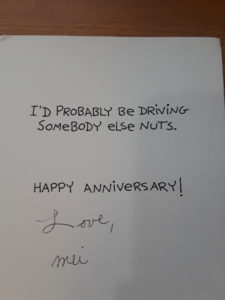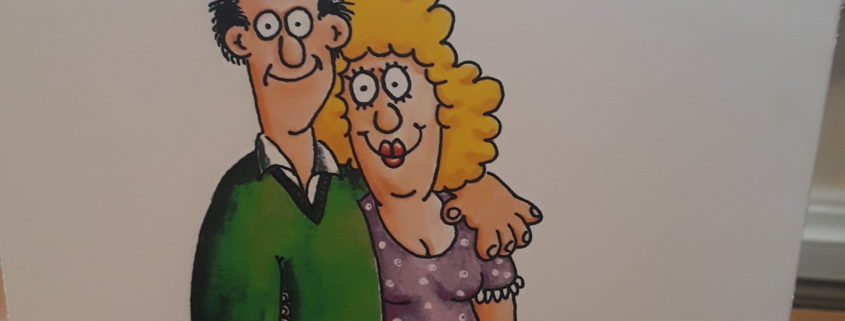What I’ve Learned from 20 Years of Marriage

“If I hadn’t found you… I’d probably be driving somebody else nuts.”
In close to 21 years, this is my favorite wedding anniversary card I have received from my partner. Of course, I love the poetic language from other cards, but this one…
It reflects some of the best parts of my spouse- his sense of humor and wisdom, in this case, his acknowledging that~
WE’RE ALL DIFFICULT and he’s grateful that I put up with his “mishugas!” (Yiddish word for craziness). I too am grateful that he puts up with mine. I believe this card contains the message we all LONG to hear… that when partners are in touch with their humanity,
… they can love us for exactly who we are.
When close friends of ours recently shared they were celebrating their wedding anniversary, I asked them, “What do you think is the magic ingredient in keeping your marriage fulfilling after all these years?” They paused and, as thoughtful people, they both admitted they would need some time to think about this important question. When they asked my spouse and I the same question, we both answered at the same time-
“ACCEPTANCE” and smiled at each other. This led to a meaningful discussion and a distillation of 3 key ingredients to a fulfilling marriage that I have learned through my personal experience. I am sure these were also influenced by my professional experiences and the research on intimate relationships.
Top 3 Lessons Gleaned from 20 Years of Marriage:
#1 Acceptance of being human and married to an imperfect (even if wonderful) human is essential.
There’s a quote in the movie, “How to Make an American Quilt” that illustrates the initial struggle and sometimes the demise (or resilience) of long-term relationships:
“Young lovers seek perfection. Old lovers learn the art of sewing shreds together and of seeing beauty in a multiplicity of patches.”
At the beginning of our intimate relationships, most partners naively set the bar unrealistically high and naturally experience disappointment, disillusionment or even despair when we come to realize that our partner is human. Partners tend to unconsciously place a lot of expectations on their lover because it’s a common experience to wish for our partner to “be” the spouse we envisioned we would have or even fulfill or heal a part of our childhood that we struggled with.
Acceptance requires compassion and is one of the greatest spiritual gifts you can give to any human being. You benefit too because of the serenity you’ll experience.
IF WE WANT OUR PARTNER TO~ appreciate our strengths and accept our imperfections (that don’t significantly impact our partner), we need to do the same for our partner.
Acceptance has to work both ways.
“Enduring love comes when we love most of what we learn about the other person and can tolerate the faults they cannot change.” – John Gottman & Nan Silver
Acceptance also does NOT mean tolerating everything about your partner.
In emotionally secure relationships, partners expect their loved one to let them know if they have (unintentionally) behaved in a significantly hurtful way, so they can repair the hurt (show empathy, validation, and understanding), and in some cases change their behavior.
If you or your partner have any unhealed emotional wounds and would like some guidance about making effective repairs, I have a few blogs: Healing from Attachment Injuries and Other Betrayals, How to Build (& Rebuild) Trust and Heal from Betrayal (video) and “What Makes for a Good Apology? The Secret to Effective Repairs.”
#2 Learn, practice, & get support in becoming more emotionally responsive (part of A.R.E.)
When my spouse and I were dating, like most couples, we naturally experienced hundreds (within just a week!) of “bonding moments”. Our bonding moments looked like most couples~ gazing into each other’s eyes, expressing words of affection, creating special memories, giving each other gifts and cards, physical intimacy, and lots of meaningful conversations in which we were present and really listened to one another.
Most of all, we were incredibly emotionally responsive in part because we were so into or “attuned” to one another. Then, similar to many couples, these moments began to fade because we didn’t know we had to prioritize them and make an effort to continue doing them in order to experience “a lifetime of love”.
Fortunately, along our love journey, my partner and I eventually learned (from couples workshops, books and therapy), that we both had to initiate these romantic bonding moments to keep our spark alive!
We also have learned how even more profound it is to be VULNERABLE and reach out for support as well as emotionally respond to one another during our difficult and most painful moments-
This is what true intimacy is all about.
A few examples of significant emotional responsiveness in my marriage:
- Just a few weeks after our dog died, I saw, from across the room, my husband’s face look sad. I asked him, “Are you missing Zen?” He came over to me and shared his grief and the tears in his eyes finally were given permission to flow.
- When a relative refused to apologize for using abusive language toward me and declared that he would no longer hold his tongue, my spouse stood by my side and insisted the relative repair the damage or we would continue to love him from a distance.
- After lying awake one night (after Covid hit) worrying about the direction to take my career, I shared with my spouse my fears and he provided the most reassuring words and unconditional, non-judgmental support.
Learning how to put our partner first (ahead of other priorities), reach out to one another or even just to receive emotional support was not how our patterns always were! Being products of our families of origin, we needed to learn about and shift our perspective on healthy adult bonding and experience having “Hold Me Tight” conversations with the support of EFT trained therapists before this became more natural for us.
What is a “Hold Me Tight” bonding conversation?
It’s an intentional conversation that includes~
sharing your fears and needs in an open, clear and authentic way with your loved one
and
your partner responding in a way that you feel heard, understood & deeply cared for.
These bonding conversations require and increase partner’s A.R.E. skills (accessibility, responsiveness and engagement), which creates more safety and security in relationships and increases the likelihood for more bonding conversations!
The two most essential questions in intimate relationships~
-
“Do you accept me for who I am?” (tip #1 above)
-
“Are you there for me?” (or A.R.E.) (tip #2)
My spouse and I had to LEARN (and continue working on) how to be more accessible, responsive and engaged (A.R.E.) in order to help our partner feel more SAFE, SEEN, HEARD and RESPONDED TO since these qualities strengthen a couple’s bond.
The examples below of A.R.E. are from the Hold me tight book by Sue Johnson, PhD.
Accessibility examples:
- “I can get my partner’s attention easily.”
- “I am not feeling lonely or shut out in this relationship.”
Responsiveness examples:
- “If I need connection or comfort, my partner will be there me.”
- “If I need reassurance about how important I am to my partner, I can get it.”
Engaged examples:
- “I can confide in my partner.”
- “I know that my partner cares about my joys, hurts, and fears.”
- “I feel safe enough to take emotional risks with my partner.”
Sue Johnson underscores the importance of A.R.E. throughout our lifetime and that it is the KEY to a lifetime of love~
From cradle to grave, we need to know we matter to the ones we love and that when we cry out in distress, someone will come to comfort us.
Demonstrating A.R.E. and having more “hold me tight” conversations has strengthened my relationship bond and the feeling that my partner and I truly have each other’s backs.
And please hear this– my partner and I have to CONTINUE working on these skills as they truly are advanced relationship skills. Few of us saw these modeled by our parents, and thus they take a lot of practice, and, in most cases, guidance from a couples therapist before they become natural.
#3 Keep your relationship interesting (in bed and out) by always learning, growing, & trying new things.
Two of the qualities that drew my husband and I together continue to be our sense of adventure and passion for continually growing. This is one of the reasons we left Chicago to start a new life in Colorado. While every relationship has peaks, valleys and plateaus, I think what’s most important is knowing that lulls can be temporary as long as you know how to add some spice to your relationship and life in general.
I feel very fortunate to share my life with a partner who is passionate about learning, introspection and having deep conversations, in addition to exciting adventures. I appreciate that my partner understands my need to infuse novelty into our day to day lives and is open to trying new things.
Passionate marriage, a book by David Schnarch, was a wedding gift I kept, but put on a shelf (& forgot about!) for a long time because, like most intimate relationships, I couldn’t imagine needing to read such a book. When I finally picked up the book, I so appreciated Schnarch’s wisdom and encouragement to hear that his research showed that physical intimacy actually peaks in mid-life (50’s & 60’s)! Woohoo! Something to look forward to!
I also have drawn inspiration from couples therapist, Esther Perel. Her TED talk, “The Secret to Desire in a Long-term Relationship” is one of my favorites. Among her many insightful ideas, one that stood out for me was her emphasis on keeping your imagination alive. Perel quoted Proust:
“Mystery is not about traveling to new places, but looking with new eyes.”
As I reflect on my 20 years of marriage~
I feel tremendous gratitude that my spouse and I were able to make it through some incredibly painful chapters due to the support and guidance of couple therapists as well as our own commitment to continually grow and appreciate the person who stayed by our side all along.
2023 Postscript-
In reviewing this blog at year 23 of my marriage, I realized that a 4th tip is necessary for me to share a FULLER picture of what has helped my spouse and I sustain a kind, fulfilling and vibrant marriage.
#4 When conflicts arise (as they do in ALL relationships), using the framework of “the cycle” as the problem has helped us stay connected as allies to work through challenges.
If you’d like to learn more about this amazing tool, check out my blog, “Transform Your Vicious Cycle into Positive, Loving Connection”.
If you need support in any chapter of your love story, I am here for you.
Contact Lana Isaacson, LCSW, CAC III, MFTC today at 720.939.2189, [email protected] or schedule your session or free consultation at this link.
I primarily practice EFT (Emotionally Focused Couples Therapy), the most successful couple therapy model substantiated by 30 years of research (95% of couples feel better, and 75% report their issues resolved) and assist with Hold Me Tight couples workshops.



